#I LOVE LANGUAGE AND LINGUISTICS
Text
calling my lover "mine" but not in the way that my toothbrush or notebook are mine, mine in the way my neighborhood is mine, and also everybody else's, "mine" like mine to tend to, mine to care for, mine to love. "mine" not like possession but devotion.
#nonbinary love#nblnb yearning#nb4nb#nblnb#wholesomeposting#yearning hours#ive been thinking about how some languages dont have a possessive tense#so you dont say “i have a thing” but rather “a thing is by me”#and like im not usually one for psycho linguistics and like critical thoughts etc etc etc#but i really like the framework of responsibility/commitment rather than ownership#i think about this mostly in terms of ecology#and relation to land#but i also love it as it applies to language shared between lovers#like i LOVE calling them mine or for them to call me theirs#but i'm also nonmonog and that was kinda weird to square for a while#and it clicked one time when i was talking about my neighborhood and i was like well#when i say my neighborhood or my city it's understood i'm not taking it away from anybody else#its understood i just mean the city where i live#so why cant we apply the same to lovers?#mine in the way i want to show up for you again and again#ok#done now
103K notes
·
View notes
Text
As much as I adore conlangs, I really like how the Imperial Radch books handle language. The book is entirely in English but you're constantly aware that you're reading a "translation," both of the Radchaai language Breq speaks as default, and also the various other languages she encounters. We don't hear the words but we hear her fretting about terms of address (the beloathed gendering on Nilt) and concepts that do or don't translate (Awn switching out of Radchaai when she needs a language where "citizen," "civilized," and "Radchaai person" aren't all the same word) and noting people's registers and accents. The snatches of lyrics we hear don't scan or rhyme--even, and this is what sells it to me, the real-world songs with English lyrics, which get the same "literal translation" style as everything else--because we aren't hearing the actual words, we're hearing Breq's understanding of what they mean. I think it's a cool way to acknowledge linguistic complexity and some of the difficulties of multilingual/multicultural communication, which of course becomes a larger theme when we get to the plot with the Presgar Translators.
#imperial radch#also a great example of the 'you don't have to be Tolkien' phenomenon#if you want to think about linguistic differences by building all the languages in your setting#and being able to explain what those differences are through actual texts in the language in question#that's AWESOME#but it's not the only way to do it#it's also interesting because of course this style only works in book form#everyone's speaking different languages but in a written account they're all 'translated' for you#but of course if it was a TV series they would all have to be speaking a language the audience understands#(or you *would* have to go wild with conlangs)#and i think that's really cool as well--#how for a series where song is so central we don't actually hear any of the actual in-universe words or any of the music#it's all been filtered#and again you know this is happening but seeing the examples of how real songs--the shape hymns and 'L'homme Arme'--are presented#makes you a lot more viscerally aware of how limited your perspective is#it's good#ann leckie i love you
2K notes
·
View notes
Text
Every now and then I think about how subtitles (or dubs), and thus translation choices, shape our perception of the media we consume. It's so interesting. I'd wager anyone who speaks two (or more) languages knows the feeling of "yeah, that's what it literally translates to, but that's not what it means" or has answered a question like "how do you say _____ in (language)?" with "you don't, it's just … not a thing, we don't say that."
I've had my fair share of "[SHIP] are [married/soulmates/fated/FANCY TERM], it's text!" "[CHARACTER A] calls [CHARACTER B] [ENDEARMENT/NICKNAME], it's text!" and every time. Every time I'm just like. Do they though. Is it though. And a lot of the time, this means seeking out alternative translations, or translation meta from fluent or native speakers, or sometimes from language learners of the language the piece of media is originally in.
Why does it matter? Maybe it doesn't. To lots of people, it doesn't. People have different interests and priorities in fiction and the way they interact with it. It's great. It matters to me because back in the early 2000s, I had dial-up internet. Video or audio media that wasn't available through my local library very much wasn't available, but fanfiction was. So I started to read English language Gundam Wing fanfic before I ever had a chance to watch the show.
When I did get around to watching Gundam Wing, it was the original Japanese dub. Some of the characters were almost unrecognisable to me, and first I doubted my Japanese language ability, then, after checking some bits with friends, I wondered why even my favourite writers, writers I knew to be consistent in other things, had made these characters seem so different … until I had the chance to watch the US-English dub a few years later. Going by that adaptation, the characterisation from all those stories suddenly made a lot more sense. And the thing is, that interpretation is also valid! They just took it a direction that was a larger leap for me to make.
Loose adaptations and very free translations have become less frequent since, or maybe my taste just hasn't led me their way, but the issue at the core is still a thing: Supernatural fandom got different nuances of endings for their show depending on the language they watched it in. CQL and MDZS fandom and the never-ending discussions about 知己 vs soulmate vs Other Options. A subset of VLD fans looking at a specific clip in all the different languages to see what was being said/implied in which dub, and how different translators interpreted the same English original line. The list is pretty much endless.
And that's … idk if it's fine, but it's what happens! A lot of the time, concepts -- expressed in language -- don't translate 1:1. The larger the cultural gap, the larger the gaps between the way concepts are expressed or understood also tend to be. Other times, there is a literal translation that works but isn't very idiomatic because there's a register mismatch or worse.
And that's even before cultural assumptions come in.
It's normal to have those. It's also important to remember that things like "thanks I hate it" as a sentiment of praise/affection, while the words translate literally quite easily, emphatically isn't easy to translate in the sense anglophone internet users the phrase.
Every translation is, at some level, a transformative work. Sometimes expressions or concepts or even single words simply don't have an exact equivalent in the target language and need to be interpreted at the translator's discretion, especially when going from a high-context/listener-responsible source language to a low-context/speaker-responsible target language (where high-context/listener responsible roughly means a large amount of contextual information can be omitted by the speaker because it's the listener's responsibility to infer it and ask for clarification if needed, and low-context/speaker-responsible roughly means a lot of information needs to be codified in speech, i.e. the speaker is responsible for providing sufficiently explicit context and will be blamed if it's lacking).
Is this a mouse or a rat? Guess based on context clues! High-context languages can and frequently do omit entire parts of speech that lower-context/speaker-responsible languages like English regard as essential, such as the grammatical subject of a sentence: the equivalent of "Go?" - "Go." does largely the same amount of heavy lifting as "is he/she/it/are you/they/we going?" - "yes, I am/he/she/it is/we/you/they are" in several listener-responsible languages, but tends to seem clumsy or incomplete in more speaker-responsible ones. This does NOT mean the listener-responsible language is clumsy. It's arguably more efficient! And reversely, saying "Are you going?" - "I am (going)" might seem unnecessarily convoluted and clumsy in a listener-responsible language. All depending on context.
This gets tricky both when the ambiguity of the missing subject of the sentence is clearly important (is speaker A asking "are you going" or "is she going"? wait until next chapter and find out!) AND when it's important that the translator assign an explicit subject in order for the sentence to make sense in the target language. For our example, depending on context, something like "are we all going?" - "yes" or "they going, too?" might work. Context!
As a consequence of this, sometimes, translation adds things – we gain things in translation, so to speak. Sometimes, it's because the target language needs the extra information (like the subject in the examples above), sometimes it's because the target language actually differentiates between mouse and rat even though the source language doesn't. However, because in most cases translators don't have access to the original authors, or even the original authors' agencies to ask for clarification (and in most cases wouldn't get paid for the time to put in this extra work even if they did), this kind of addition is almost always an interpretation. Sometimes made with a lot of certainty, sometimes it's more of a "fuck it, I've got to put something and hope it doesn't get proven wrong next episode/chapter/ten seasons down" (especially fun when you're working on a series that's in progress).
For the vast majority of cases, several translations are valid. Some may be more far-fetched than others, and there'll always be subjectivity to whether something was translated effectively, what "effectively" even means …
ANYWAY. I think my point is … how interesting, how cool is it that engaging with media in multiple languages will always yield multiple, often equally valid but just sliiiiightly different versions of that piece of media? And that I'd love more conversations about how, the second we (as folks who don't speak the material's original language) start picking the subtitle or dub wording apart for meta, we're basically working from a secondary source, and if we're doing due diligence, to which extent do we need to check there's nothing substantial being (literally) lost -- or added! -- in translation?
#translation#linguistics (sorta)#I love language so much#long post#subtitling#dubbing#transformative work#if you read all the way to the end - THANK YOU I am so impressed#localisation#this is not an academic essay but I still feel bad for not citing sources#low vs high context cultures and languages are concepts from intercultural communication studies#but idk how up to date that is or whether folks even still actually use them#I know they oversimplify things#but it helped me say what I was trying to here so shrug#languages#language soup#meta#language meta#fandom meta of sorts#thanks for the help sorting this out kayla <3#my nonsense
1K notes
·
View notes
Note
You actually CAN use different words to muffle emotional effects! we've been making euphemisms for death for as long as we've had language, that's why we say things like "passed away". even the word "die" was an old Norse euphemism for the old English word "sweltan", which itself is a euphemism for the even older word "diegan". (I really agree with your post, the origin of using "unalive" is incredibly dystopian and censorship is awful, I just wanted to infodump about linguistics)
that's actually really cool!!!! thank you for sharing!!!
also anon i'm in a linguistics fixation right now so we shall have a summer wedding
#ramble#i LOVE LANGUAGE#passing this onto my boyfriend who also loves language AND anything norse#if i could go back to uni and was actually smart i would study linguistics so i could be amy adams in arrival
326 notes
·
View notes
Text
Irish language things
One of the many things I find interesting about Irish is that we have no word for yes or no. There are a few languages like this in which you echo back the question as a response.
So in English if you are asking “Did you buy ___?”.
You could reply with “I did buy ___”, but that’s quite formal and nobody would really say that. So you can simply reply with “yes/ no”.
But in Irish if you ask the same thing “Ar cheannaigh tú ___?”.
You can only reply with “Cheannaigh mé/ Níor cheannaigh mé ___”. Meaning I did buy/ I didn’t buy ___.
Young Irish speakers try to get away with using “Tá” or “Sea” as a universal yes and “Níl” as a universal no. But this is incorrect and drives older Irish speakers/ teachers mad. So don’t use them in your orals!
Most people do shorten things by just saying “Cheannaigh/ Níor cheannaigh” and not echoing back the whole sentence of what you did/ didn’t buy.
But yeah it’s just another one of those interesting linguistic things that can’t be fully translated to English. And it actually causes problem for people in school learning Irish because we try to translate what we’re thinking in English onto the paper.
Gotta love the English colonialism still affecting us to this day!
#I might do more of these cause I love talking about Irish#ireland#irish#gaeilge#linguistics#language#languageblr#languages#langblr
218 notes
·
View notes
Text
"linguistics is my passion!! i love languages!!"
what do you mean there are multiple different runic systems. what do you mean the runes in The Hobbit are completely different from the runes in Lotr. what do you mean i have to learn a completely different runic system now.
#jrr tolkien was a fucking nerd and i love him for it#but it is so fucking hard to stop myself from hyperfixating and learning every language system he's created#i've got shit to do man#tolkien#lotr#the hobbit#lord of the rings#jrr tolkien#linguistics#runes#middle earth
106 notes
·
View notes
Text
tbh the survival of small languages and dialects of all stripes is deeply important to all our cultures-- and I don't mean this in a weirdo blood-and-soil nationalist way-- because it helps to keep different ways of thinking and seeing alive. Often, languages come with their own perceptions on time and colour and days and night, anything they could possibly have. Major languages too, but the smaller ones are always at risk of being lost to time... and with them go the context, the meanings and the different perspective that its individual speakers could have had.
For instance, in Scots, there's a fundamental minor difference to time and how it relates to the individual compared to standard English. In Scots you can often hear folks saying phrases like 'that's me away' (or awa' in very broad Scots, pronounced a bit like awah), when you're looking to leave a place. Taken literally in English that would be incorrect, as you are not in fact physically leaving, and it's not like you're watching your own body wander off out the door. However, in this case the 'what is about to be', and the 'what is right now' are functionally the same thing. Time becomes a little malleable in the Scots way of looking at it.
Of course this is hardly the only example and I am sure people can add their own examples of similar but... it's interesting to think about, isn't it? How your language approaches both the physical and the abstract, and how its constructed your brain to think. Because language physically shapes your brain, and knowing more is always good for the old grey matter.
#chatter#language#scots language#linguistics#i love the scots language now#I used to be IMMENSELY embarrassed about speaking it#and if anyone wants to know why you are well within your rights to ask!#the Scots-speaker angle is a very strange wee existence#not the beautifully-endangered faerie-like brogue of the Gaels#not the robust unstoppable beast of the Anglos#a strange offshoot sister from days gone by who never left#but who is generally seen as unbearably common and vulgar#despite its history as both a language of law and a language of poetry
273 notes
·
View notes
Text
If you want to describe your characters as autistic without explicitly saying they are autistic, you csn say they have the lonely disorder.
In China, the word for mild autism (higher functioning autism, level 1, low support needs, whatever you call it, you know what I mean) literally translated to "lonely disorder" which I love so much. So damn accurate 🥲🥲🥲🥲🥲 狐独症 gū dú zhèng
The word for a more severe autism is 自闭症 self enclosed disorder, zì bì zhèng. My autism is more mild so I can't speak as to whether I like that, as a translation.
A bit of writing tips!
#autism#writing disability#writing autistic characters#chinese language#chinese langblr#chinese culture#traditional chinese culture#china#languages#linguistics#lan wangji#autistic lan wangji#autistic lan zhan#actually autistic#the Chinese do not sugarcoat#it's a very blunt language and i love it#actuallyautistic#the untamed#lan zhan#autistic#mdzs#character writing tips#character writing#writing tips#writing advice#writing help#writing resources
250 notes
·
View notes
Text
Ok so i personally believe that interstate trade in the wasteland is alive and well, especially along the coasts, but there HAS to be some like. Linguistic weirdness happening in the wasteland. With radio communication, I'm sure there's a "standard english" that prevents a lot of people from getting tooooo granular of a dialect, but it doesn't take that long for languages to change, really. Where are the pidgin languages? The new expressions? The funny sayings? The things that no vault dweller would understand because they come from an entirely different culture?
You'd probably have a lot of languages that are related, like the romance languages, or even Esperanto, where someone can parse the meaning even if they aren't a native speaker. Lots of English/Spanish variants of course, but can you imagine giving the Appalachian dialect 200 years to marinate? Cajun? Minnesotan?? The people in the Commonwealth should be speaking like theyre from another planet. The sole survivor is talking like a Jane Austen novel, unable to comprehend the words a Bostonian mind has had 200 years to come up with.
#fallout#fallout 4#kal talks#im not a linguist but man... i think about it#i know theres a process for dialects turning into languages#and iirc a pidgin language is a dialect that has no distinct system of writing#iirc a lot of accents have been disappearing because the 'standardized accent' in tv and radio has been#sort of training (american) people out of their accents#which is such a shame i fucking LOVE accents#accents are soooooooooo cool and there's such a cool history about why people talk the way they do#I WANT ACCENTS!!! I WANT DIALECTS!!!!!!!
112 notes
·
View notes
Text
10 Verbal Nouns in Irish that I very much enjoy
Ag Smúrthacht - prowling, slinking around the place
Ag Airneán - staying up late into the night
Ag Plobarnach - gurgling (of water or porridge)
Ag Santú - ‘greeding’ for something (((also to desire seggsually)))
Ag Slaparnach - trudging around/through shallow water/mud
Ag Spréacharnach - glittering
Ag Rógaireacht - swindling or otherwise engaging in divilment
Ag Pleidhcíocht - fooling around, messin’
Ag Goilliúint - wounding emotionally
Ag Meabhrú - brooding or pondering
warning: 🚨not caighdeán approved🚨 (also these are rough estimations of meanings and there are 100% other verbs which cover these same things please dont break my tibia)
#gaeilge#irish language#brooding#ponderings#language#linguistics#swamp#ireland#irish#northern ireland#insomia#vocabulary#new vocab#porridge#river#prowl#i love the caighdeán pls give my family back#verbs#celtic languages
300 notes
·
View notes
Text
Love for Love's Sake | Things You Didn't Notice #4 | Fight with Homophobes
Honestly, I wanted to dissect these scenes right away but then we got the rest of the show uploaded and the emotions overshadowed me. But now we're diving into informal Korean speech, swearing and slurs! It's going to be a fun post, let's go :D
Disclaimer: I'll be writing down both English and Korean slurs strictly in educational manner, obviously.
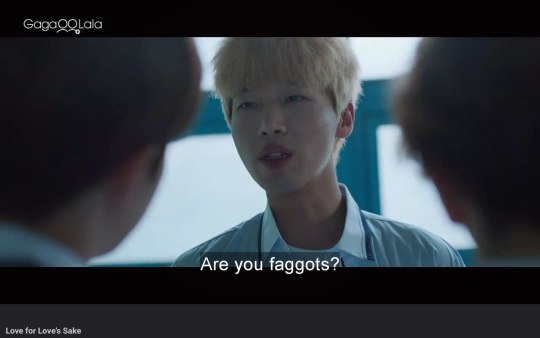
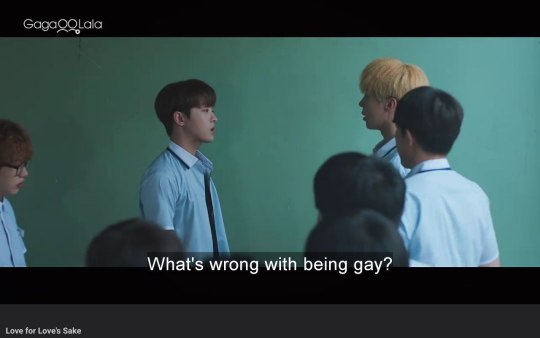
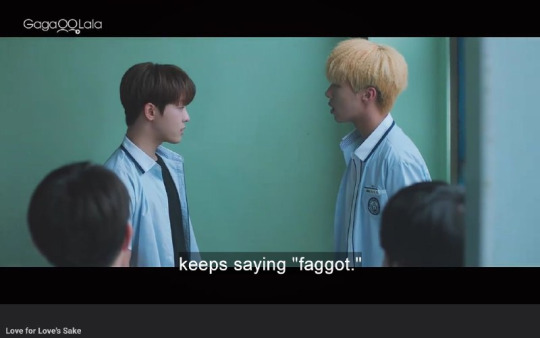

"Fuck. You two are always so fucking close together. (to Myungha) Are you also a faggot (homosekki)? Wow, Kyunghyun's skills are so good."
"Why are you so vulgar? What's wrong with being homo?"
"You're really crazy. Are you criticizing me?"
... (Myungha kisses Tak Junho)
" Ah fu— You damn faggot!"
"We both kissed. I'm not the only one who's homo. You're homo too~"
"You did it yourself, you faggot!"
"Ah, our Junho keeps saying 'homo'. Tss, slurs are forbidden."
"Shut up, you faggot."
"If you call me homo one more time, I can steal your lips for real. (Junho is silent) Ha, afraid you'll be robbed?"
Honestly, I like the translation in subs this time, I just wanted to give you a more technical version (and to show you the difference, because in Gaga subs the f slur is also used by Myungha but it's not exactly that)
So, as far as I noticed, the slur in Korean is a derivative from the term "homosexual" - thanks to the similar sounding, it became "homosekki" (from sekki - asshole, bastard, bitch etc). This is the word Junho keeps using in almost every sentence. And the socially accepted common term is now "gay" (at least, the cast and couple from Korean reality dating show "His Man 2" refers to themselves as 'gay' and not 'homo').
Myungha uses the original term, just "homo", which also gained a negative connotation but doesn't include a 'sekki' swearword. So he keeps saying "homo" to talk back in the language Junho used, only less derogatory. We'll see later but it's amazing, because both Myungha and Sangwon confidently used this word about themselves (Sangwon even went further and proudly reclaimed the slur itself).
Still, Myungha did threaten gangster Junho not to even call him "homo" or any similar terms. And here's the moment which made me laugh: in the next scene with Sangwon, Junho was angry ranting about Myungha, but he caught himself using the slur "homosekki" and quickly changed to the modern and neutral term "gay". LOL
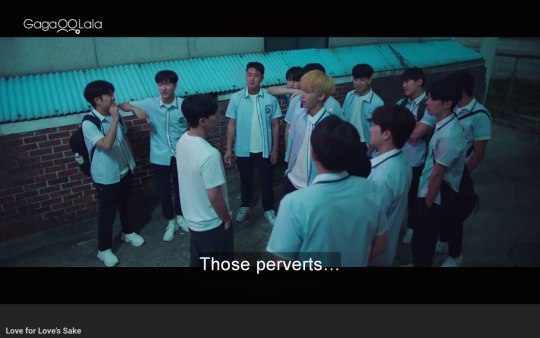
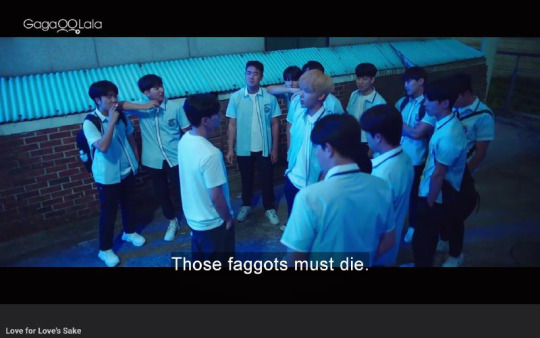

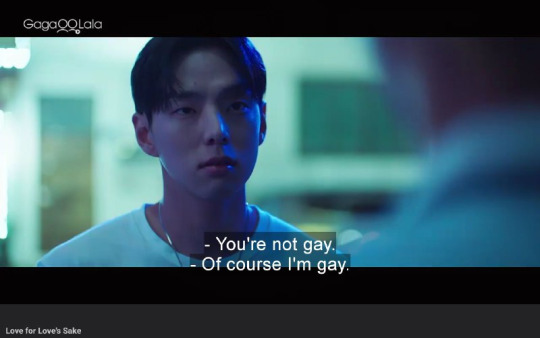
Which is what Gaga subs failed to show it to us. Again, let's see more technical translation:
"I'll go after Tae Myungha and Ahn Kyunghoon soon, just so you know. Those fa– Those gay bastards must die. That fucker Tae Myungha kissed me in the lips, shit. Isn't it fucked up? It was disgusting."
(Sangwon, pouting) "Wow, really? It must've been nice."
"Jeez, you asshole. You're not a victim so you dare talking shit."
"I'm being serious, though?"
(Junho, appalled) "What the hell are you talking about? You're not a faggot."
"I am a faggot, though?"
One, why is it so funny that the first reaction Sangwon had, hearing about Myungha kissing someone in a fight, was: awww :( i wish it was me :((( you so lucky :((
Second, it's hilarious how the gangster ends up the ONLY person who ever uses nice and modern term "gay" once in this show because our protagonists both hit him back with the derogatory terms (Sangwon even attached the slur to himself, when he only liked girls before falling in love with Myungha at first sight, what a legend).
Let's wrap it up with slurs and check out another small detail: informal speech in Korean.


(Sangwon to Myungha)"Why would we fight here?"
(Yeowoon to Sangwon)"Hey, watch your tone (don't use informal speech)"
"Was I talking like that with you?"
"Talk curt (informally) only with me."
"I'm already being curt (talking informally) with you."
This one is definitely a cultural thing that always gets lost in translation (but "being curt" is a nice way of putting it). There are two general styles of speech in Korean: Formal (존댓말, jondemal) and Informal (반말, banmal). Of course, it's a lot more complicated in the language, but I'll paint briefly the differences that are pointed out in the scene.
I talked in previous posts about properly addressing your senior in korean (usually by title/position). To convey respect to your senior, you also use 요 (yo) at the end of the sentences – and both Sangwon and Yeowoon talk politely to Myungha. UNTIL Sangwon uses the rude version of a question, without polite ending ("Why would we fight here?"), to which Yeowoon protests and tells Sangwon that it's banmal, informal speech, and he should only use it with him.
Because with your friends, same age people (Yeowoon and Sangwon in this case) or people younger than you, it's normal to use their names with different intonations (Think Myungha's "Yeowoon-ah, Yeowoon-ie") and talk informally.


(Yeowoon to Myungha) "I asked who it was."
"You're being curt (that's an informal speech)".
Fast forward – Yeowoon loses patience and demands Myungha "I asked who it was", question without polite ending as well. To which Myungha cheekily says "that was an informal speech", reminding Yeowoon of his own remark to Sangwon.
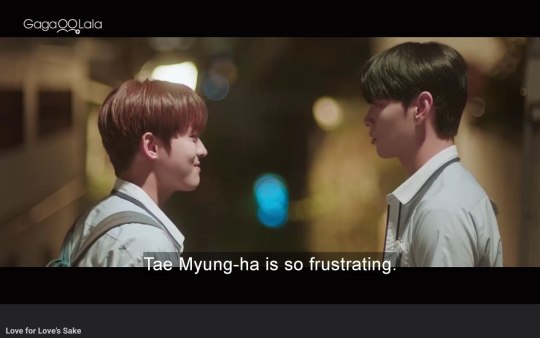

Fast forward again – and now I have to take back my previous statement from another post that Yeowoon never called Myungha by his name because I found the rare case of him doing it xD
"Tae Myungha is so frustrating."
"You're speaking informally more often these days."
Again, a youngster! calling his senior! by his own name! Not using the polite ending! The horrors of informal speech. He's not being too rude but he's sulking therefore he's rebelling. Though I can swear, again, Yeowoon hears Myungha's scolding and resorts back to speaking politely, and from now on, he'll keep using 'senior'.
If you survived until the end of this post, congratulations! The second half probably wasn't needed but in case you're learning Korean or you want to know why these seemingly normal phrases are being considered "curt" out of nowhere, I hope you understand it now a little bit better :)
// Previous messages translation + other language moments here //
#love for love's sake comments#watch me writing my own course Learning Korean with Kdramas on tumblr#but that fight dialogue scene was just perfect i couldn't resist#the exchange and usage of different terms was funny and the scene was hilarious on its own#sangwon and myungha are my heroes#love for love's sake#love for love's sake meta#bl meta#korean bl#korean drama#love supremacy zone#dropthemeta#korean language#linguistics#language
183 notes
·
View notes
Text



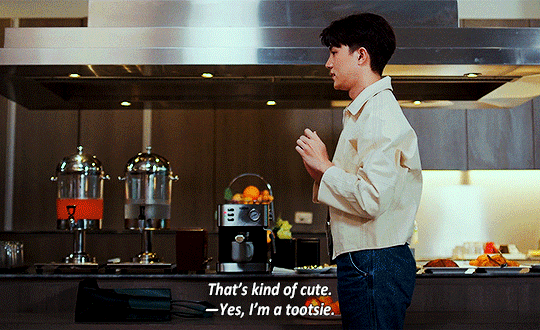


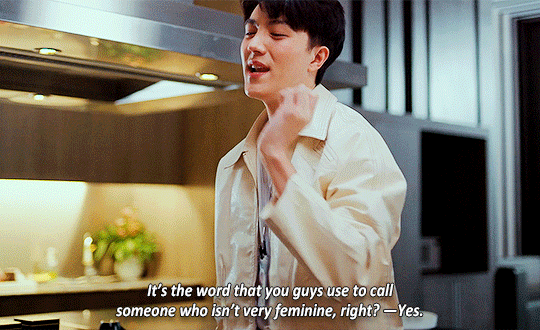
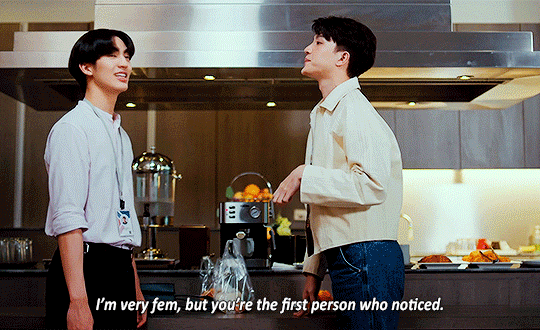
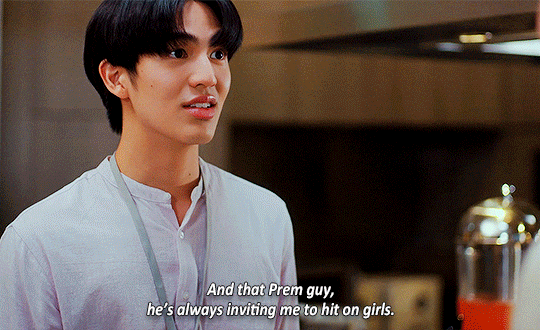
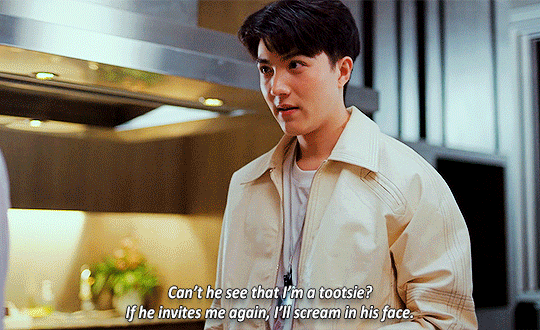
A few notes on Pat and Chot's conversation:
🔹Ke (เกย์) is a neutral expression that is the phonetic adaptation of the English word gay.
🔹Tut (ตุ๊ด) is a vulgar and pejorative expression used to refer to a very effeminate homosexual man and can have multiple translations, as sissy, queen, [or in this case: tootsie] etc.
🔹Je (เจ๊) is a Thai honorific from 姐 for “elder sister”. Chot uses it to refer to himself. Pat later uses it to address Chot.
🔹krap/kha (ครับ / ค่ะ) are gender-oriented particles. Chot uses the traditionally female particle for himself.
🌈Sources: LGTBIQ+ Enciclopaedia, Thaipod101
#step by step#step by step the series#bruce sirikorn#ben bunyapol#stepbystepedit#thai bl#thai drama#bl drama#bl series#my edits.#i added some notes and explanations that imo make this conversation easier to understand#because a lot of the nuances are lost in translation#which isn't the translator's fault - it's just how language works#i love it so much#and i love bruce#and we need more fem gays in bl#who are allowed to be loud and proud and are celebrated for it#Tud/tut might come from the movies Tootsie but I'm not sure#(false friends are a super common thing in linguistics and i haven't checked the word's etymology)#it's a term that chot has very obviously reclaimed for himself
817 notes
·
View notes
Text
i feel bad when non-native English speakers apologise for making mistakes or getting confused like babe no you're doing great. this isn't on you. the fact that I've seen so many native English speakers mispronounce the word pronunciation and misspell the word spelling should tell you everything you need to know about this goddamn language.
#weirdly specific but ok#asmi#english#linguistics#pronunciation#english speaking#english spelling#english is weird#as someone whose first language is english#mad respect to everyone for whom it's not#you're doing great#the language is not#i love english#but... well#english language#language stuff#phonetics#language#english is a funny language
142 notes
·
View notes
Text
WORD POLL
You CAN say:
"It will RAIN" ☔️ 🌧️
"It will SNOW" ❄️☃️
"It will THUNDER" ⚡️⛈️
"It will HAIL" 🧊🥶
BUT can you say…
If you like judging weird English sentences like this and have 12 minutes to spare on a fun multiple-choice questionnaire, you would be doing me an enormous help if you fill in this questionnaire for my final year linguistics undergrad dissertation!! You get to be at the cutting edge of linguistics research by assigning funny little scores to funny little sentences, and there are no wrong answers :)
If you reblog this to signal boost I love you <3 Thanks Tumblr!
#languages#words#grammar#english language#linguistics#poll#tumblr polls#research#if you reblog this i love you <3#fun
168 notes
·
View notes
Text
I have a lot of new followers so just to make it clear I love trans people and neopronouns are cool as fuck and linguistically interesting and it/its pronouns are also awesome and whatever pronouns or language you use to describe yourself is real as fuck.
#scaring away any TERFs idk#also just thinking about how cool neopronouns are#and then like#EMOJI PRONOUNS???#I’ve seen them before like a few times and it’s like#THATS SO LIKE UNIQUELY MODERN LIKE#NO OTHER TIME WOULD THAT DEVELOP#I LOVE IT ITS LIKE YOURE AN ITEM IN A VIDEO GAME#Like#<You need to go talk to 🐝> or whatever#cool as hell#ok I don’t have anything else to add#boo 👻 boo 👻 if you’re like a weird exclusionist or terf or whatever go away 👻#ok I’m done#language#queer linguistics#queer language#Quinn posts
103 notes
·
View notes
Text
Goblin mode is the word of the year I absolutely love learning language
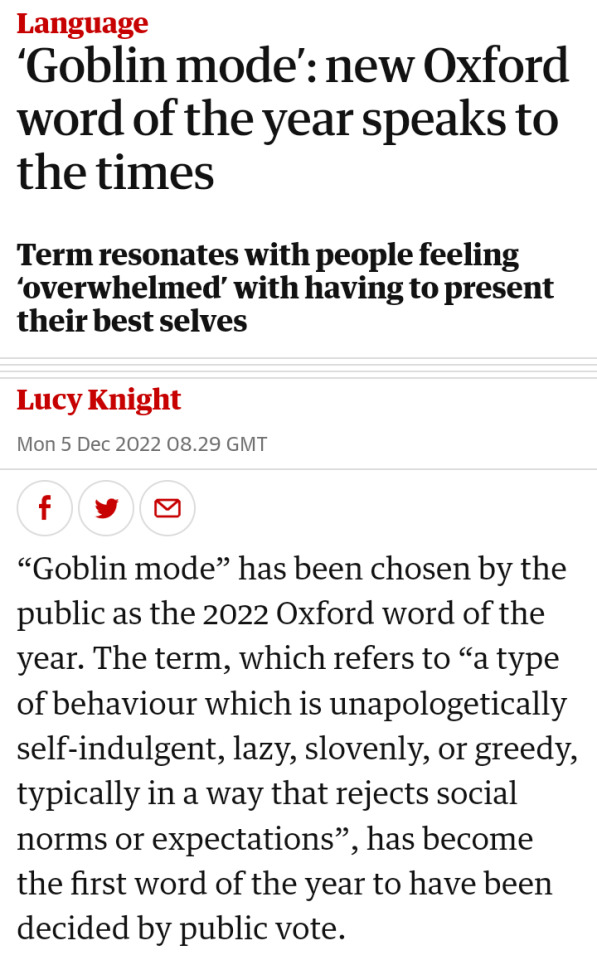
#as a nonnative i love learning these terms that come out of the internet#i never understand most of them specially the ones that are from here#language#linguistics#also such a mood
2K notes
·
View notes